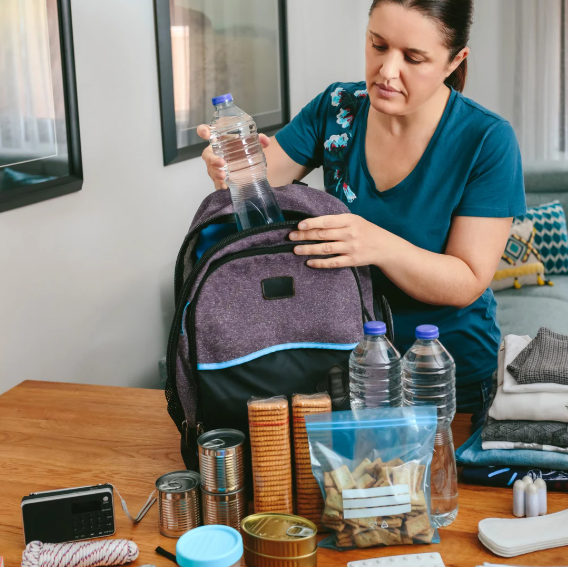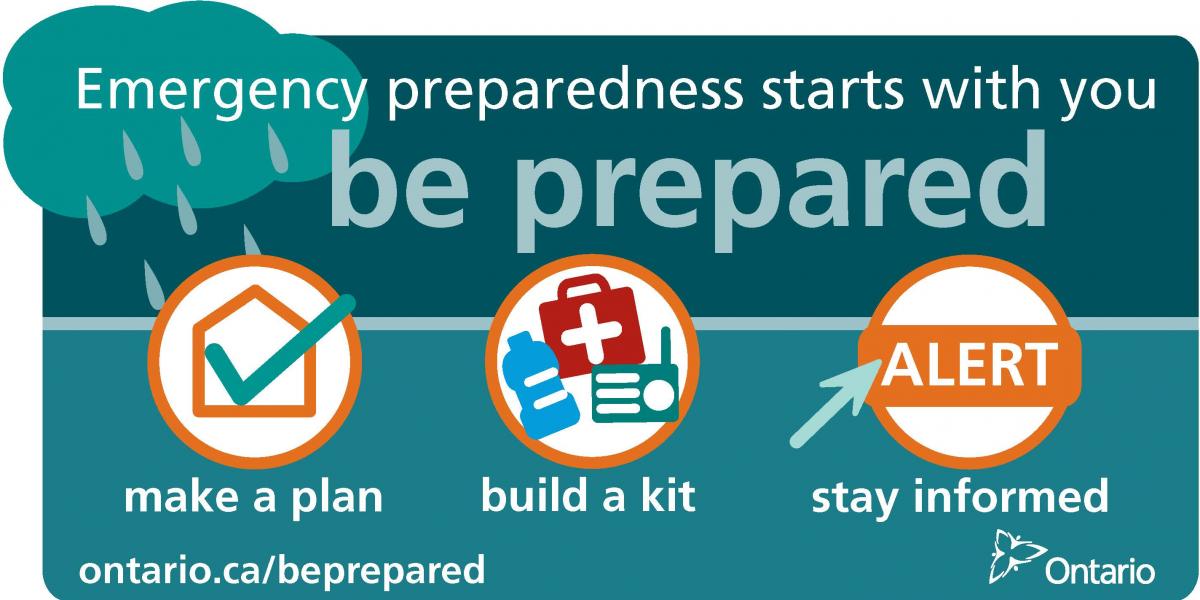Community Emergency Management
The organization and management of the resources and responsibilities for dealing with all humanitarian aspects of emergencies (preparedness, response, mitigation, and recovery). The aim is to reduce the harmful effects of all hazards, including disasters.

Raymond Lux
Deputy Chief, Community Emergency Measures Coordinator - Paramedic Services
Tel : 519-881-1291
The Community Emergency Management Coordinator (CEMC) is responsible for the promotion, development, implementation and maintenance of the emergency preparedness plans for the County of Bruce. Emergency management consists of four areas - Mitigation/Prevention: Actions taken to reduce or eliminate the effects of an emergency or disaster. - Preparedness: Actions taken prior to an emergency or disaster to ensure an effective response. - Response: Actions taken to respond to an emergency or disaster. - Recovery: Actions taken to recover from an emergency or disaster.

Our community, provincial and federal governments have created emergency plans to help keep everyone safe.
Bruce County, through its Emergency Management Program, is responsible for ensuring County response to an emergency is effectively coordinated.
Bruce County consistently provides resources and communications to keep residents informed and protected.
Don't forget your pets when planning for emergencies.
Are you ready for a prolonger power outage?
Winter doesn't wait for you to be ready - winterize your at-home emergency kit.
Travel smart this winter and have a vehicle emergency kit.
Your municipality is prepared to activate and operate evacuation centres in times of crisis.
Create an Emergency Preparedness Plan.
Stay safe during hot summer weather.
When thunder roars, go indoors.
Here are more resources to stay informed.
Bruce County's Emergency Response Plan
Alert Ready - Canada's Emergency Alert System
Saugeen Valley Conservation Authority Flood Warnings
Helpful Resources:
Emergency KitsBe Prepared Grey Bruce
Ontario Government – Be Prepared
Emergency Preparedness Guide
Floods – What to Do
Severe Storms - What to Do
Power Outages – What to Do
Emergency Preparedness for Farm Animals
Emergency Preparedness for People with Disabilities/Special Needs
Pocket Guide to Emergencies
Do 1 Thing
Emergency Management Information
The Community Emergency Management Coordinator (CEMC) is responsible for the promotion, development, implementation and maintenance of the emergency preparedness plans for the County of Bruce. Emergency management consists of four areas - Mitigation/Prevention: Actions taken to reduce or eliminate the effects of an emergency or disaster. - Preparedness: Actions taken prior to an emergency or disaster to ensure an effective response. - Response: Actions taken to respond to an emergency or disaster. - Recovery: Actions taken to recover from an emergency or disaster.
The Emergency Management and Civil Protection Act is the legislative authority for emergency management in Ontario. The Act is supplemented by an Order in Council that sets out which provincial ministers are designated special emergency responsibilities in emergency management. For communities and the provincial government, the Emergency Management and Civil Protection Act provides for the establishment of an emergency management program in Ontario, based on hazards and risks that the people of Ontario may face. Elected heads of council are responsible for ensuring emergency management programs exist within their jurisdictions.
When emergencies happen, they are routinely dealt with at the community level by local emergency response organizations, including police, fire, emergency medical services and public works. Most emergencies do not require provincial assistance. If a major emergency occurs in a community, the local head of council should implement their emergency response plan or declare an emergency if required. The head of council, supported by local officials who come together as the Community Control Group, then work to ensure a controlled, centralized and coordinated emergency response. Individuals are responsible for their own safety, and the well-being of their families. Everyone should be prepared to take care of themselves and their families for up to three days in the event of an emergency or disaster.
Teaching your children how to use 911 is crucial and could save their lives or yours. Here are four simple steps for teaching your children, no matter how old they are, how to use 911: First explain what 911 is. Teach them to assess the risks before dialing 911. Explain what type of information to give once they have called 911. Practice scenarios with them to make them more familiar with the concept without frightening them. For more 911 information for children, please see this safety tip. You can share it with your family and friends
A flood, extended power outage, hazardous material leak or other disaster could affect water supply, cut electricity and phone service for days or even weeks. Emergency responders will be on the scene, but they can't reach everyone right away. Being prepared means being ready to cope for at least the first 72 hours of an emergency while those in urgent need are helped first. It can also make real situations less stressful for you and your family. There are lots of quick, inexpensive things you can do to prepare your family (some of them take less than five minutes)! Know the risks - learn about local risks and plan for those that are more likely to occur. Is there spring flooding? Forest fires? Earthquakes? To find out more click here.
Make a family emergency plan - since your family may not be together when an emergency happens, a plan will help you and your family know what to do and how to reach each other in an emergency. Click here to check out the "Make a Plan" video. Talk to your Kids about emergencies. Teach them basic personal information so they can Identity themselves if they become separated from you, and who to call like 9-1-1 or your local emergency number, to get help.
Get an emergency kit -find out exactly what goes in a kit by watching the short Video, Build a Kit Video (getprepared.gc.ca) then share the link with friends or family.
Take part in Emergency Preparedness Week, during which the County joins with other municipalities, the Province of Ontario, the Government of Canada and other partners in raising awareness about the importance of being prepared.
Download and read our local “Be Prepared Grey Bruce Huron” publication or some of our other online resources available on this Page.
what3words
Did you know that emergency call centres often cannot detect a caller’s precise location?
In an emergency, identifying exactly where help is needed is critical to getting resources there quickly. This can be nearly impossible if you’re in a remote area with no street address, no obvious landmarks, or on an unnamed trail. In these moments, emergency services can waste precious time and resources just trying to find you. Help emergency services find you faster in an emergency by learning how to share your what3words address.
Using what3words to help 9-1-1 find you You can use the what3words app to communicate your precise location to a 9-1-1 call centre by telling them your ‘what3words address’, a unique combination of three words that identify a 3-metre by 3-metre location. This is far more precise than a traditional cell phone 'ping' often used by emergency services. Plus, once downloaded, the app is able to work offline. This makes it ideal for rural areas that may have a poor or unreliable data signal.
Watch what3words in action:
 Logo
Logo